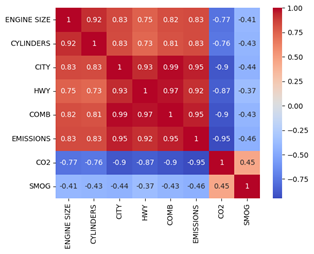Comparison of Support Vector Regression and Random Forest Regression Performance in Vehicle Fuel Consumption Prediction
Main Article Content
Abstract
Predicting vehicle fuel consumption is an important aspect in improving energy efficiency and supporting sustainable transportation. This study aims to compare the performance of Support Vector Regression (SVR) and Random Forest Regression (RFR) algorithms in predicting combined vehicle fuel consumption (COMBINED, a combination of 55% urban and 45% highway). The Canadian government's Fuel Consumption Ratings dataset was used, with 2015-2023 data (9,185 entries) for training and testing, and 2024 data (764 entries) for further testing. Pre-processing involved StandardScaler for numerical features and OneHotEncoder for categorical features, followed by hyperparameter optimization using Grid Search, resulting in optimal parameters: SVR (C=100, epsilon=0.5, gamma=1) and RFR (n_estimators=200, max_depth=None, min_samples_split=2). Results show RFR is superior with R2 0.8845, RMSE 0.9671, and MAE 0.6566, compared to SVR with R2 0.8648, RMSE 1.0462, and MAE 0.7150. Evaluation on 2024 data and visualization of error distribution corroborate the superiority of RFR. This study concludes RFR is more effective for COMBINED prediction, although SVR is competitive post-optimization, and contributes to the selection of machine learning models for green vehicle technology.
Article Details
References
[1] Tonmoy Choudhury, Umar Nawaz Kayani, Azeem Gul, Syed Arslan Haider, and Sareer Ahmad. Carbon emissions,
environmental distortions, and impact on growth. Energy Economics, 126:107040, 2023.
[2] Jiannan Wang and Waseem Azam. Natural resource scarcity, fossil fuel energy consumption, and total green-house gas emissions in top emitting countries. Geoscience Frontiers, 15(2):101757, 2024.
[3] Karen McKee. Potential effects of elevated atmospheric CO2 on coastal wetlands. Technical report, Reston, VA,
2006.
[4] Leonel J. R. Nunes. The rising threat of atmospheric CO2: A review on the causes, impacts, and mitigation strategies. Environments, 10(4):66, 2023.
[5] Frederica Perera. Pollution from fossil-fuel combustion is the leading environmental threat to global pediatric health and equity: Solutions exist. International Journal of Environmental Research and Public Health, 15(1):16, 2017.
[6] W. Saputra, A. Permatasari, M. Ichsan, and T. Syakira. Strategi pengembangan bahan bakar nabati melalui pemberdayaan perkebunan sawit rakyat di indonesia. SPOS Indonesia, pages 16–17, January 2022.
[7] G. M. Nguegnang. Predicting fuel consumption in power generation plants using machine learning and neural networks. arXiv preprint, page arXiv:2202.05591, 2022.
[8] Z. Yusuf, Wardhiah, G. Syamni, M. J. A. Siregar, and Y. A. Sitepu. The effect of CO2 emissions in indonesia. IOP Conference Series: Earth and Environmental Science, 922:012026, 2021.
[9] N. F. Alayida, T. Aisyah, R. Deliana, and K. Diva. Pengaruh digitalisasi di era 4.0 terhadap para tenaga kerja di bidang logistik. Jurnal Economina, pages 254–268, 2023.
[10] D. S. Pangesty, A. Budiharjo, and P. Rusmandani. Pengaruh kecepatan kendaraan terhadap konsumsi bahan
bakar minyak di jalan tol. Siklus: Jurnal Teknik Sipil, pages 1–8, 2021.
[11] So rin Yoo, Jae woo Shin, and Seoung Ho Choi. Machine learning vehicle fuel efficiency prediction. Scientific Reports, 15:14815, 2025.
[12] Sohaib Zahid and Umar Jamil. Data-driven machine learning techniques for fuel economy prediction in sustainable transportation systems. Green Energy and Intelligent Transportation, page 100303, 2025.
[13] R. F. K. Canal, G. Riffel, and G. Gracioli. Machine learning for real-time fuel consumption prediction and driving profile classification based on ecu data. IEEE Access, 12:68586– 68600, 2024.
[14] Iqbal H. Sarker. Machine learning: Algorithms, real-world applications and research directions. SN Computer Science, 2:160, 2021.
[15] A. J. Smola. A tutorial on support vector regression. Statistics
and Computing, 14(3):199–222, 2024.
[16] L. Breiman. Random forests. Machine Learning, 45(1):5–32, 2001.
[17] Government of Canada. Fuel consumption ratings, 2015– 2024. Natural Resources Canada.
[18] Nur Aisha Al Zahra Tualeka, Mohamad Atok, and Aimatul Ummah Alfajriyah. Perbandingan metode random
forest regression (rfr) dan support vector regression (svr) dalam memprediksi risiko kredit pada bank xyz. Jurnal Teknik ITS, 13(6):540–547, 2024.
[19] F. E. Penalun, A. Hermawan, and D. Avianto. Perbandingan random forest regression dan support vector regression pada prediksi laju penguapan. Jurnal Fasilkom, 13(2):104– 111, 2023.
[20] Y. Yang, N. Gong, K. Xie, and Q. Liu. Predicting gasoline vehicle fuel consumption in energy and environmental
impact based on machine learning and multidimensional big data. Energies, 15(5):2–17, 2022.
[21] D. Chicco, M. J. Warrens, and G. Jurman. The coefficient of determination r-squared is more informative than smape, mae, mape, mse and rmse in regression analysis evaluation. PeerJ Computer Science, 7(3):e623, 2021.
[22] T. O. Hodson. Root-mean-square error (rmse) or mean absolute error (mae): When to use them or not. Geoscientific Model Development, 15(14):5481–5487, 2022.

